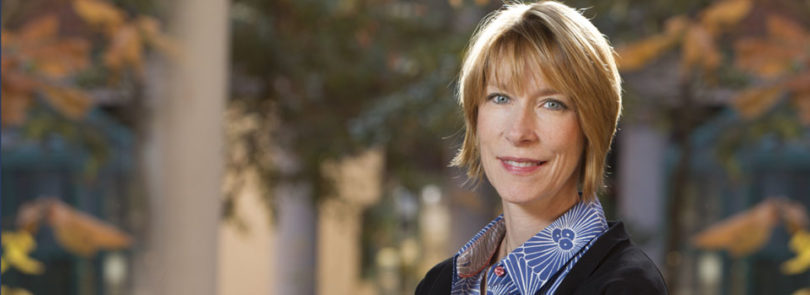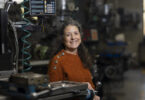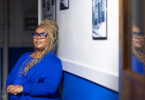Sarah Covert, professor and associate dean for academic affairs in the Warnell School of Forestry and Natural Resources, provides students with practical skills and a better understanding of the biological world around them.
Where did you earn degrees and what are your current responsibilities at UGA?
I earned my undergraduate degree in biochemistry at Dartmouth College and my Ph.D. in bacteriology at the University of Wisconsin-Madison. I am currently the associate dean for academic affairs in the Warnell School of Forestry and Natural Resources. I oversee the school’s instructional programs and student services. I also serve as its promotion and tenure unit head.
When did you come to UGA and what brought you here?
After starting my postdoctoral work at the University of Arizona, I transferred my fellowship to UGA in 1992 when my husband was hired here as a faculty member in what is now the department of kinesiology. I joined the Warnell faculty a year later. We were both attracted to UGA because of the excellent colleagues in our respective fields and because of the small-town charm and academic sophistication that characterizes Athens.
What are your favorite courses and why?
I enjoy teaching students practical skills that help them advance in their chosen profession, or about the great variety and utility of the biological world. On the practical skills front, I currently co-teach an undergraduate course called “Professional Development for Natural Resource Students” that helps students research careers and successfully find employment. Courses like this one provide students with a practical framework for applying and communicating what they have learned in their other courses. On the biology front, I particularly enjoyed teaching an Honors seminar on the “Fabulous and Fearsome World of Fungi.” Fungi are incredibly important—both ecologically and economically—but they are rarely covered in any depth in standard biology courses. As a result, there is a wealth of interesting material to cover in a course that provides an overview of this biological kingdom.
What interests you about your field?
I am trained as a fungal geneticist and ever since I was in graduate school I have been intrigued by the idea that studying fungi—many of which are ecologically, agriculturally, medically and/or industrially important—can lead to improvements in the human condition. I also love the puzzle-solving aspect of collecting molecular genetic data and figuring out what it all means. As an administrator, I especially like to work on projects that add value to our academic programs or student services, and I appreciate the strong correlation between the effort applied to a project and its outcome.
What are some highlights of your career at UGA?
I have had excellent fungal biology colleagues at UGA—a truly supportive community of scholars. Among them have been several graduate students whose work was particularly noteworthy and of whom I am very proud. More recently, I have found it very rewarding to administratively support our school’s growing suite of field courses, which provide students with transformative, hands-on training in the real world.
How does your research or scholarship inspire your teaching, and vice versa?
Developing a course on research skills for graduate students many years ago allowed me to become much more clear-thinking about my own scientific research and the relative merits of different projects. It also strengthened my effectiveness as a graduate mentor. In contrast, my research expertise in fungal biology directly influenced how I chose to teach a course on forest health.
What do you hope students gain from their classroom experience with you?
It depends on the course. In some cases I primarily hope to teach intellectual or communication skills that students will apply throughout the rest of their careers. In others, I hope they will come away with a better understanding of the biological world around them and how to mitigate problems within it.
Describe your ideal student.
One who is curious, insightful, eager to improve his or her skills through steady work, and who has already mastered the ability to write well.
Favorite place to be/thing to do on campus is…
I love to walk down D.W. Brooks Mall in the autumn, when all of the leaves have taken on varied hues of red, gold, orange and brown.
Beyond the UGA campus, I like to…
Spend time with my family and the great community of friends that we have in Athens. Reading to my kids is a highlight of every day and, if time allows, I love to take modern dance classes.
Community/civic involvement includes….
I recently served for two years on the board of directors for Sandy Creek Nature Center. Several years ago, I was on the board for Canopy Studio, where community members of all ages and abilities can learn the art of aerial dance and performance. Both are fabulous assets to our community, and I wish I still had time to serve on their boards.
Favorite book/movie?
I don’t think I have a favorite book or movie, but books that I would strongly recommend for adults include these three novels: “Cutting for Stone” (Abraham Verghese), “The Unlikely Pilgrimage of Harold Fry” (Rachel Joyce) and “Caleb’s Crossing” (Geraldine Brooks), and these three nonfiction works: “The Warmth of Other Suns” (Isabel Wilkerson), “The Immortal Life of Henrietta Lacks” (Rebecca Skloot), and “Zeitoun” (Dave Eggers). For older elementary school kids, I strongly recommend any of the books in the “Penderwicks” series (Jeanne Birdsall), as well as “The Giant Slayer” (Iain Lawrence).







